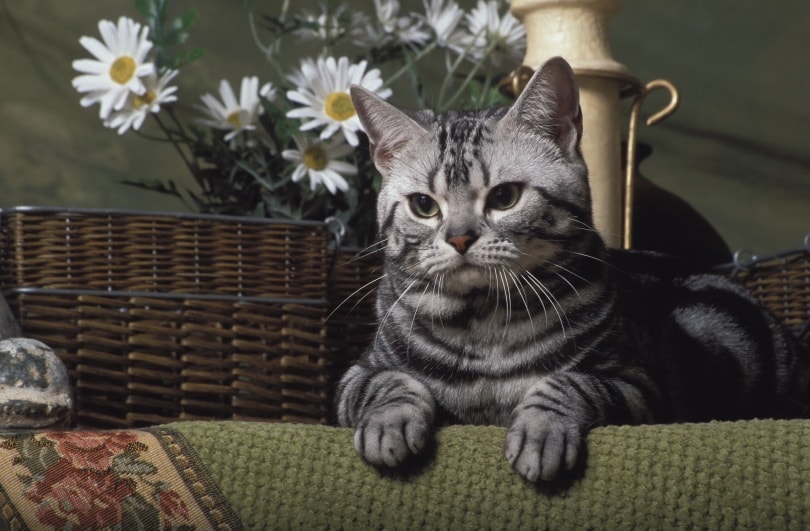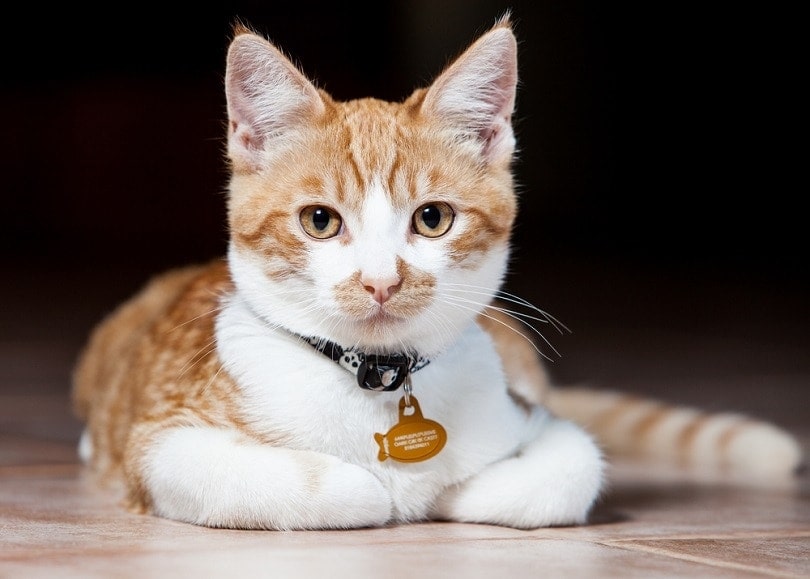How to Help Cats With Stress (12 Vet-Approved Tips)

Updated on
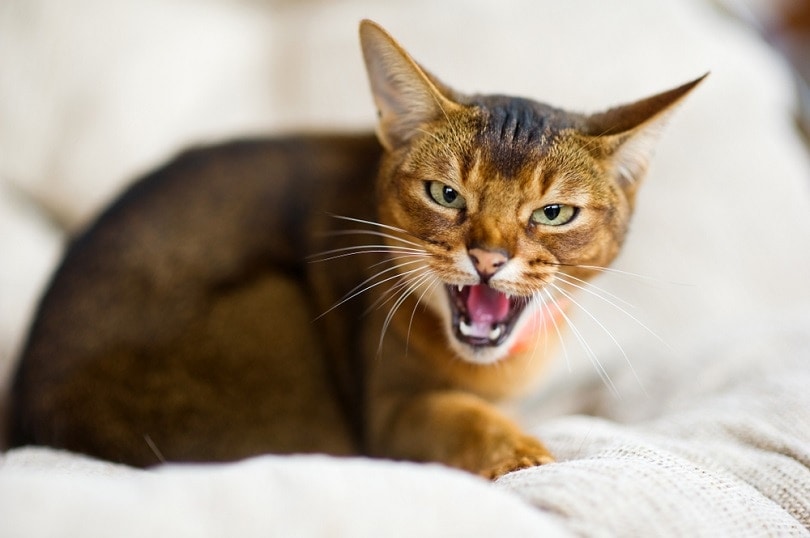
It’s always worrying to see our pets not feeling their best, especially if they seem stressed. Cats are very good at hiding any stress or illness, but it’s essential to know the cause so you can remedy it. Before trying to alleviate stress, ensure that your cat is not injured or sick, as many signs of stress are similar to those of illness or injury. Once they’ve had a clean bill of health from the vet, you can help them de-stress. Keep reading to discover 12 tips on how to help your cat with stress.
The 12 Vet-Approved Tips to Help Cats With Stress
1. Give Them Their Own Space
Cats like owning their own territory. They map out their environment and home to find the most comfortable places and make them their own. You might notice your cat prefers one room in the house or a specific corner and rubs their face on all the furniture inside. This is their way of saying, “This is my place,” as they rub their scent to mark out their territory.
If your cat is stressed, consider giving them a room in the home to call their own or a special corner full of their favorite toys and a comfortable hideout to relax. If the space is big enough, placing their food, water, and litter bowls inside is best, so they can fully withdraw. Ensure the space is dark and quiet, and allow your cat to sit inside undisturbed. This gives your cat a safe space to retreat and socialize on their terms, reducing all kinds of stress.
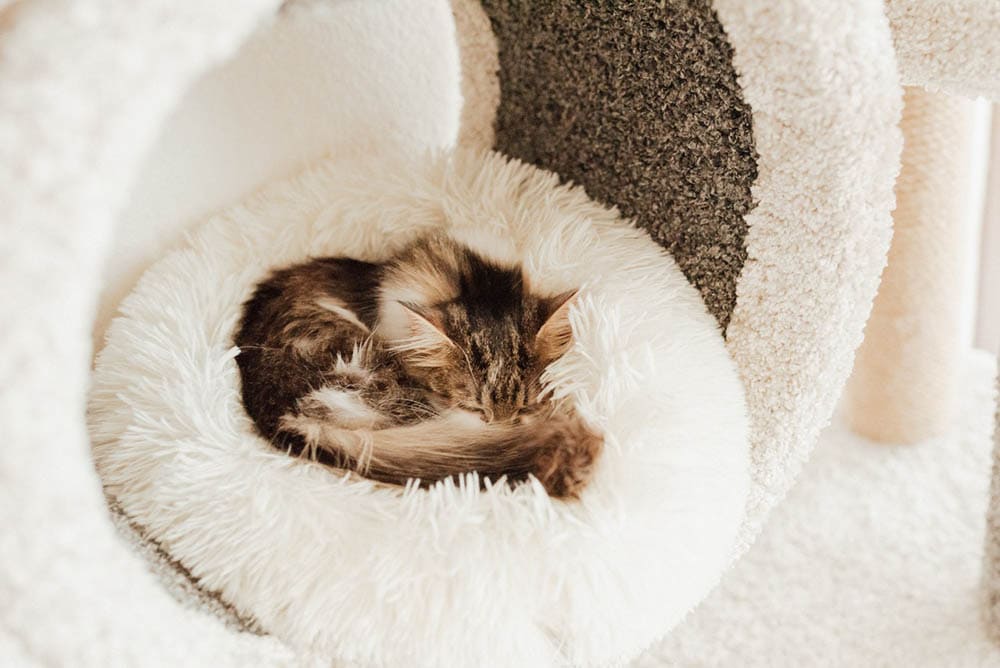
2. Use Pheromones in the Home
When your cat rubs their face or sides on you, your furniture, or other home pets, they’re marking their territory with pheromones. This isn’t as aggressive as it sounds, as cats will establish any items within their territory that they love and are important to them (such as their owners). These pheromones make up a scent profile within a cat’s territory that helps them feel safe and secure.
Pheromone diffusers such as Feliway and other sprays and roll-ons contain a synthetic version of these pheromones called “cat facial pheromones F3,” or “happy cat” pheromones. When the diffuser is plugged in or used around a room, it can replicate the calming, soothing scent profile of a cat that’s happy and calm and in safe surroundings. This can help your cat de-stress and feel more secure. The multi-cat version of the synthetic pheromones can also help with inter-cat conflict, since they mimic the pheromones released by a nursing queen, called “cat appeasing pheromones,” and these promote harmony.
3. Set Up Enough Resources
If you have more than one cat living in your home, you might have noticed some odd behavior from them. One cat might sit in door frames or on staircases, blocking the way for other cats, for example. This behavior is known as resource blocking or guarding and is common in multi-cat households. The cat on the receiving end of this behavior can be under immense stress, as they won’t be able to get to the food, water bowls, or litter boxes.
If multiple cats share a litter box, the behavior can be taken a step further; cats can sit outside the box and swipe at other cats that try to use it. Even if the other cat manages to get into the litter box, the overwhelming scent of the dominant cat can cause lots of stress and make them miserable.
The way to resolve this is to ensure that enough resources are available and distributed in different places for each cat. The general rule is one litter box per feline, plus one. This can also be applied to other resources, so for two cats, there should be three of each resource (litter boxes, bowls, etc.). Reducing this type of conflict is the key to reducing stress in all the cats involved.
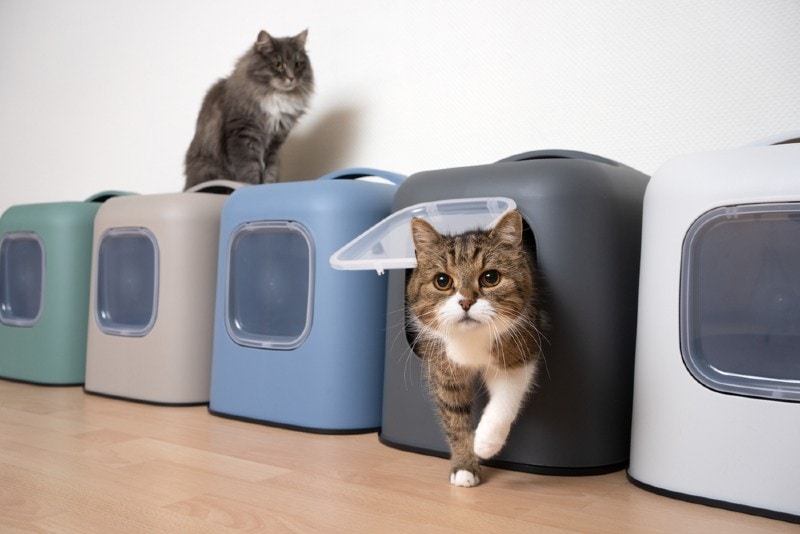
4. Reduce Conflict
Following on from the previous point, reducing inter-cat conflict is key to reducing stress in your cats. If you introduce a new cat into your home, any resident felines might react negatively, potentially causing high stress levels. Using pheromone diffusers and providing enough resources are two critical factors in reducing cat conflict, but the compatibility of the cats is also a big factor.
Both personality clashes and lack of socialization when younger can cause cats to become aggressive in their communications, leading to conflict and large amounts of stress. You should never force cats to interact with each other, and giving each their own separate space can go a long way in reducing conflict and stress. You should try a socialization plan based on positive reinforcement, as certain introductions might take a while.
However, if your cats are incredibly stressed and these methods don’t work, it may be time to consider rehoming the new cat, to avoid all the negative consequences that chronic stress will have on their health and quality of life.
5. Give Them Hiding Spaces
Cats like to feel enclosed and safe (while having an exit), which is why many of them like to sit in cardboard boxes. Cats that live outside or in feral colonies will rest in enclosed spaces they feel safe in since potential threats can’t get them from behind, on the sides, or above. This is why providing covered beds, cardboard boxes in quiet areas, or cat trees with enclosed boxes can help cats de-stress.
These items enable cats to retreat to a place they feel safe and secure, so they can remove themselves from stressful situations. Giving them a favorite toy and a spray of “happy cat” pheromone before letting your cat enter can help them feel at home!
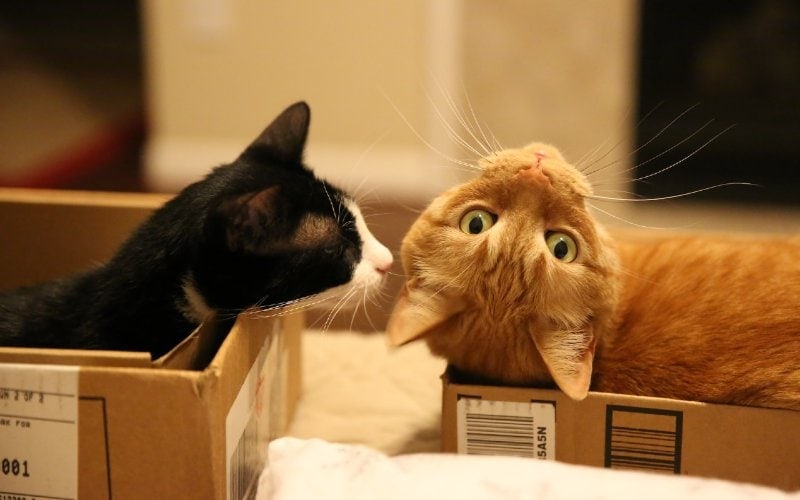
6. Use Vertical Space
Cats also like to be up high. Many cat owners can attest to this, as kittens are hilariously known for climbing pants legs or curtains! But adult cats need the opportunity to rest in high places, too, for a different reason. Cats will instinctively seek out higher altitude since it provides great vantage points over their territory, and they do this for both predatory and defensive reasons.
Cats can find prey easier when looking down over their stomping grounds, but it’s also unlikely they can be crept up on by potential threats. High vantage points help them scratch this instinctual itch and help them feel more secure. Providing a tall cat tree or shelving at different levels around the home can help your cat feel calmer with their feet off the ground.
7. Give Them a Chance to Enact Natural Behavior
Scratching, hunting, and climbing are all innate behaviors for a cat; if they can’t express these satisfactorily, they can become stressed. A cat that doesn’t have areas to scratch will scratch on other “alternatives” (such as furniture).
If they are shouted at or directed away from scratching each time they try, they’re unable to carry out behavior deemed “essential,” which can cause large amounts of stress. Providing areas where they can scratch, jump, run, climb, and play can reduce stress for your cat and you, as they can perform all the behaviors they need to, and you can control where it’s done!
8. Give Them Attention (If They Want It)
Some cats are more affectionate than others. There are cats that are happy being around their family without one-on-one interactions, and some cats wake their owners with kisses each morning. Respecting your cat’s needs and giving them space or affection on their terms is very important for managing stress.
Forcing a feline to interact when they don’t want to can result in anxiety. Each cat will have different social needs, so meeting them on your cat’s level is essential to keep them happy and reduce their stress levels.
9. Consider a Catio
If your cat seems dissatisfied with indoor life and pines for the great outdoors, a catio might be the way to go. Catios are outdoor structures that keep them safe and secure while enabling them to enjoy the outdoors. They provide excellent enrichment opportunities and give your cat lots of novel experiences, and most allow for physical exercise and climbing. These factors are instrumental in reducing feline stress, and a catio might be your best bet if your cat is stressed indoors.
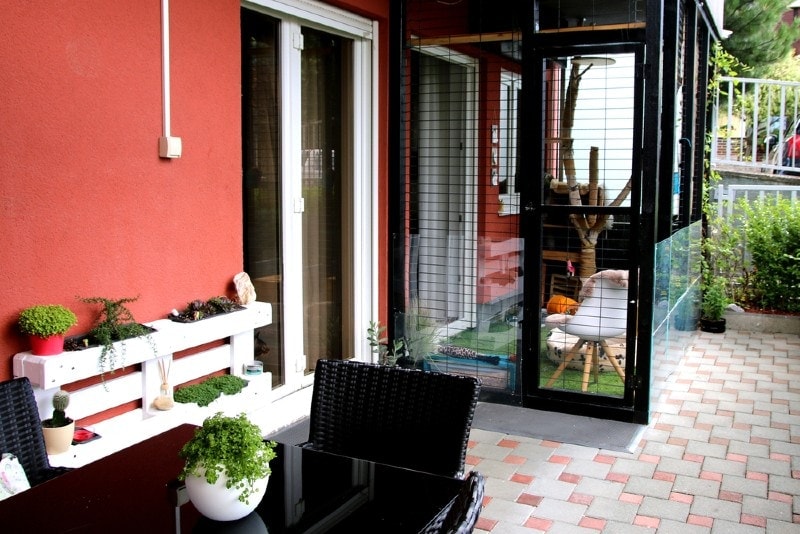
10. Establish a Routine
Most cats are creatures of routine and comfort. Predictability is a great tool in reducing feline stress since cats that know what to expect can feel more in control of their surroundings and what goes on. A cat will develop their own routine around the household, which helps them feel secure and confident.
Disruptions in routine can cause significant stress; even something as small as moving a food bowl can disrupt a cat’s day and stress them out. Keeping a regular schedule can help a cat’s stress management, as they need to know what to expect and when!
11. Keep on Top of Their Health
Flea, tick, and worm treatments are vital in ensuring your cat lives a stress-free life, as there’s nothing more irritating than being bitten to pieces! Flea bites can be particularly stressful for cats, as many are allergic to their saliva. Flea allergy dermatitis can lead to extremely itchy and painful scabs on the skin, hair loss, and general malaise. Monthly preventative treatments can eliminate this source of stress for our cats while helping them stay healthy and flea-free.
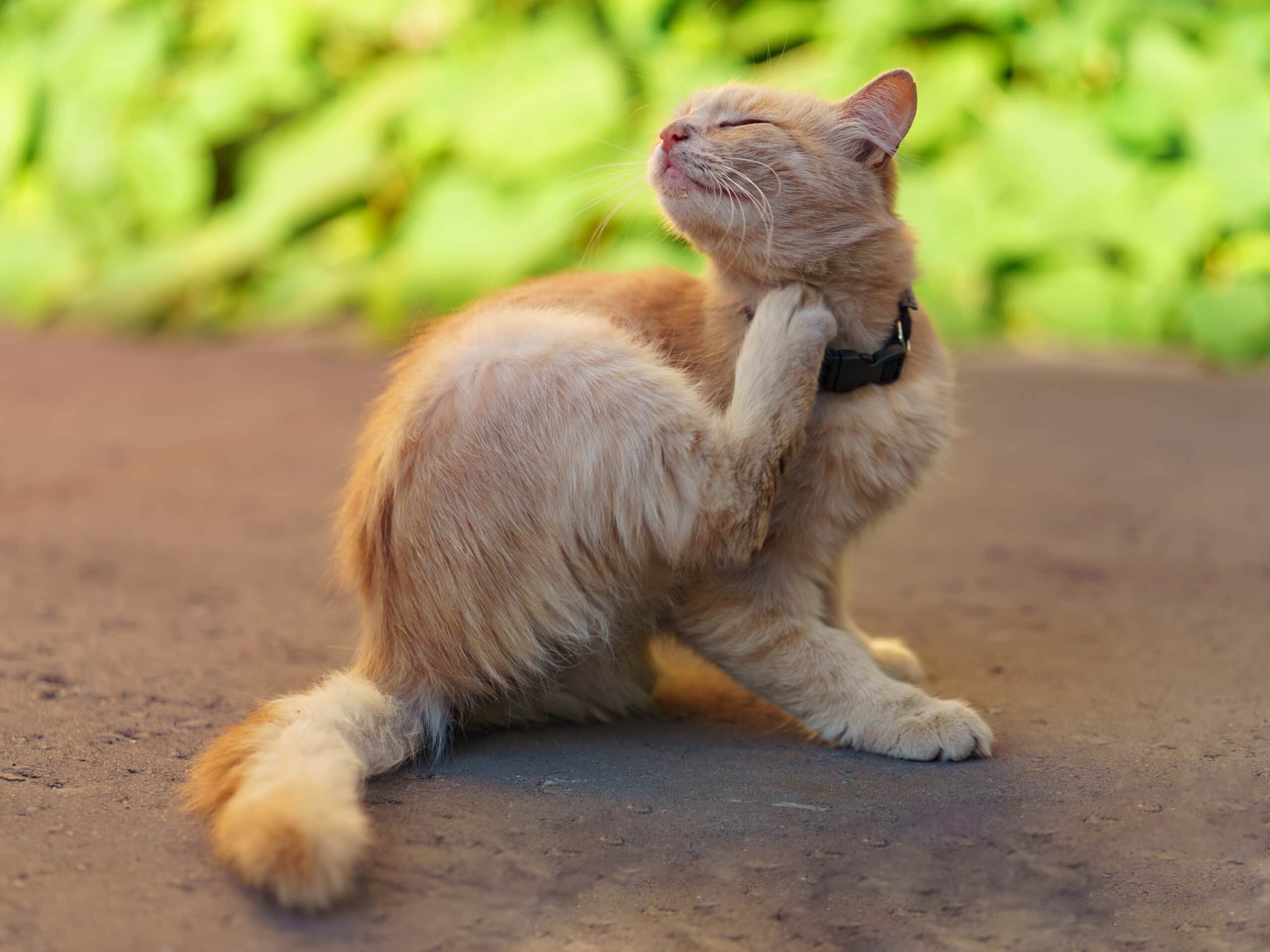
12. Reduce Other Stresses in the Home
A calm home is a happy home, and the same is true for cats. If other stressors in the home make their family stressed, your cat will pick up on that too. Calming down the environment is key to reducing your cat’s overall stress, so if there’s conflict within the home (arguing, shouting, loud noises, etc.), trying to minimize this will positively affect your cat’s stress levels.
What Are the Signs of Stress in Cats?
Cats can be subtle when showing signs of stress and illness. Knowing which ones indicate stress is essential.
- Hiding/Avoidant behavior
- Overgrooming
- Behavioral changes, such as pooping outside the litter box
- Inappropriate scratching
- Changes in eating or drinking habits
- Meowing or vocalizing excessively
- Acting afraid
- Licking mouth and nose to excess
- Vomiting/Diarrhea
- Crouched and tense body language
Remember that many of these signs can also be caused by illness, so if you notice any changes in your cat’s behavior or any signs mentioned previously, take them to the vet.
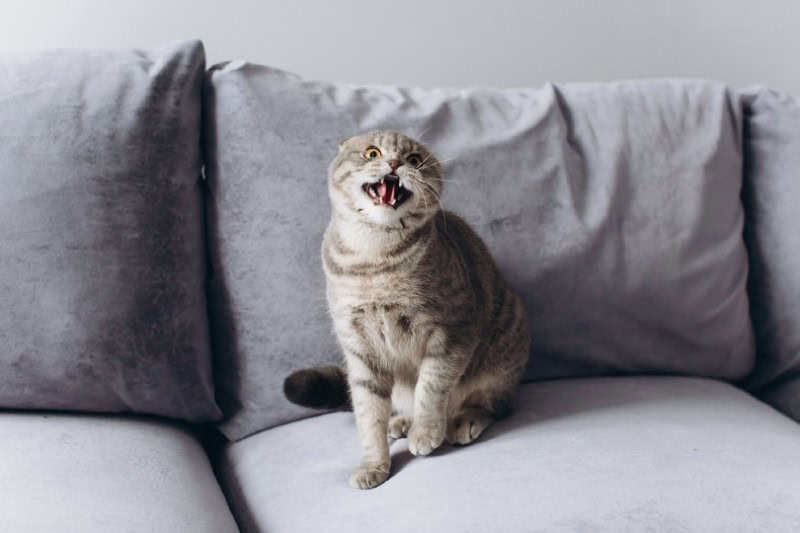
Can Cats Recover From Stress?
Cats can recover from stress, but complete recovery takes time. Acute stress, such as visits to the vet, is usually resolved quickly, but chronic stress can take months to completely resolve and is often more difficult to remedy.
Can Stress Shorten a Cat’s Life?
Unfortunately, stress can have a negative impact on a feline’s quality of life, health, and longevity. Chronic stress is particularly harmful to cats since stress elevates heart rates, blood pressure, and respiratory rates and releases higher levels of cortisol (the stress hormone) into their bodies. In cats that are chronically stressed, these changes can mean their bodies are constantly triggered.
Cats living like this are more susceptible to illness, and it is well recognized that stress negatively affects the immune system, making them more susceptible to infections. Feline interstitial cystitis is not infectious like a normal UTI, but it is known to be triggered by stress, which can make it a challenging recurrent health problem for many cats.
Conclusion
Reducing stress in our feline friends is important, and there are many situations and environmental factors that can cause it. Loud noises and sudden movements are some of the more minor things that can cause stress in cats, and inter-cat conflict or lack of resources are the larger causes. Either way, there are several ways we can help cats cope with and reduce their stress, leading to happier cats and calmer homes. Remember, signs of illness are often similar to stress, so taking your cat to the vet to check for any sicknesses is crucial before tackling the stress head-on.
Featured Image Credit: Slava Dumchev, Shutterstock




